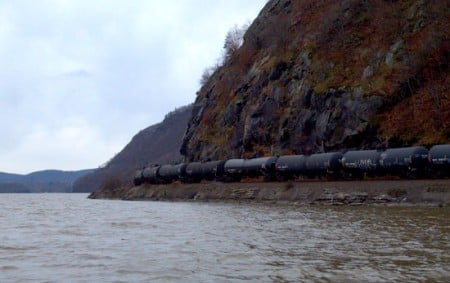04.07.14 ::
Bomb Train Facts

View more images on our Flickr site
Riverkeeper is urging our members and supporters to write to the Secretary of the U.S. Department of Transportation to take immediate action to reduce the risk from transportation of crude oil by rail through New York State. Riverkeeper has also called for a moratorium on these shipments.
Here are some recent facts relevant to the call to action:
- There have been at least four oil train derailments in New York State, including three since November 2012, in West Nyack, Town of Ulster, Selkirk and Cheektowaga. Two joint federal-state “inspection blitzes” have identified dozens of safety problems in New York State rail lines and tank cars.
- A CSX train blocked access to an entire section of the town of Saugerties, NY, for about 90 minutes this week while it made emergency repairs; CSX is the rail operator that was fined $10,000 last month for not immediately informing federal, state, and local safety agencies for a recent crude oil train derailment in Town of Ulster. During the time it blocked access to part of Saugerties, emergency and fire vehicles had no access to homes east of the tracks, according to the Police Chief.
- The National Transportation Safety Board is holding a 2-day meeting in D.C. in April to further examine whether crude-by-rail is safe, even though recommendations they issued in January have already clearly concluded that such shipments, under current regulations, are not safe.
- According to industry and government estimates, the transport of crude oil by rail has risen over 400% in the last five years. Most of that volume is made up of Bakken crude and tar sands oil transported in unsafe and outdated DOT-111 railcars.
- The DOT-111 railcars lack any of the basic safety mechanisms (such as shields, pressure vents, or thicker hulls) called for in reports issued by the NTSB, a growing number of bipartisan group of Congressional leaders, many federal agencies, and even the railroad industry itself!
- These DOT-111 crude oil tankers are just small enough to fit through a federal loophole exempting them from having detailed, comprehensive, federally-approved emergency response plans.
- Given that Bakken-sourced crude oil is more explosive than “normal” crude, and that tar sands oil is heavier and more viscous that “normal” crude, federal and state safety organizations throughout the nation (including the United Nations!) are reexamining spill response plans, emergency procedures, and clean-up scenarios; this reassessment of the underlying dangers posed by these new, more deadly forms of crude oil were only initiated after almost a dozen major derailments, explosions, and accidents which have resulted in lost lives and decimated ecosystems.
- With rail lines, crude oil terminals, and expansion plans for more capacity throughout the Hudson, we extrapolate that, very soon, more than 7 billion gallons of crude oil could be moved through New York State each year; already, 20% of all Bakken oil output makes its way from North Dakota through New York State.
